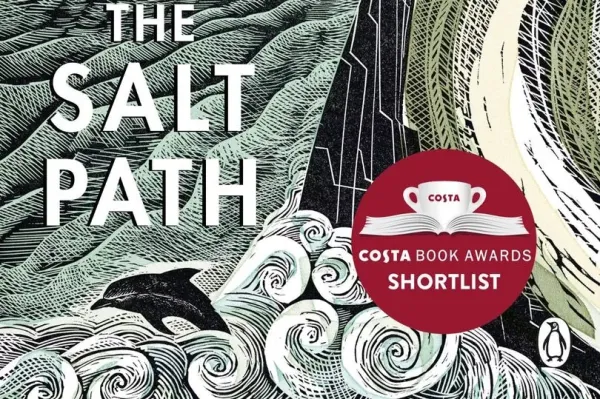
A story of heart-wrenching perseverance or a tale of tricky deceit? Published in 2018, Raynor Winn’s widely acclaimed memoir details her and her husband Moth’s experience with homelessness captured hearts (and wallets) – so much so that it was turned into a movie starring Gillian Anderson. Now a recent investigation by The Observer claims that it may have been partly made-up. But Raynor is hits back, saying that the "article is highly misleading."
The Salt Path, which sold over two million copies, follows the couple (whose real names are Sally and Tim Walker) as they endure a series of unimaginable hardships. After losing their farmhouse and Moth is diagnosed with terminal illness, they embark on a journey along the 630-mile South West Path.
Critics widely praised the book as a life-affirming story. However, an investigation by The Observer claims that there are key elements of the tale that may be untrue. Journalist Chloe Hadjimatheou visited and spoke with people who knew the couple and uncovered major discrepancies.

READ MORE: Popular crime writer calls on Goodreads to 'protect authors from online abuse'
A major allegation made by the report is that Sally allegedly embezzled over £60,000 from a business she was managing. This a stark deviation from the book’s version of events which states that the couple lost their home due to a bad investment.
The Observer spoke with Ros Hemmings, the wife of Sally Walker’s former employer. Ros claimed that Sally had been working part-time as a bookkeeper at her husband’s family-run business when they noticed money had gone missing.
Ros and her husband Martin suspected Sally of having embezzled £9000 from the business. When she was confronted, Sally paid the money back with a cheque. However, after further investigation, the couple realised that closer to £64,000 had gone missing. They informed the police and Sally was called in for questioning. Although after being instructed to report to the police once more, Sally “vanished”.

According to the report, records also show that the couple may have retained ownership of a house in France during the pair’s homelessness, which has cast the story into further doubt.
Other serious claims made by the report include the alleged lies surrounding Tim’s terminal illness. In the memoir, Sally wrote that Tim had been diagnosed with corticobasal degeneration (CBD) – a rare and generally fatal neurodegenerative disease, which typically holds a life expectancy of six to eight years. Yet, Tim has apparently lived with it for 18 years.
Professor Michelle Hu, a consultant neurologist and professor of clinical neurosciences at Oxford University, was one of several experts to share her scepticism with The Observer. She said: “I’ve never looked after anyone [with CBD] that’s lived that long.”
However, despite the investigation's claims the couple have defended the memoir's contents. Raynor told The Mirror:
"We are taking legal advice and won’t be making any further comment at this time. The Salt Path lays bare the physical and spiritual journey Moth and I shared, an experience that transformed us completely and altered the course of our lives. This is the true story of our journey.”
For more stories like this subscribe to our weekly newsletter, The Weekly Gulp, for a curated roundup of trending stories, poignant interviews, and viral lifestyle picks from The Mirror's Audience U35 team delivered straight to your inbox.
But the allegations, if true, hold ramifications for those who read and believed Raynor's tale. Catherine Simpson is the author of two memoirs, When I Had A Little Sister and One Body, which deal with the suicide of her sister and her own experience with breast cancer respectively. She also has a third due to come out in August, Hold Fast: Motherhood, My Autistic Daughter and Me.
As someone who also teaches memoir writing, she finds the allegations deeply troubling. She says: "When I teach memoir-writing the first thing I say is that if you are writing your story and claiming it is memoir then it must be true. That is the contract that you have with the reader. Nothing else will do."
She adds: "I have found the situation with The Salt Path shocking because it has made me feel naïve and foolish. I had certain doubts about it – although I wouldn’t have felt comfortable voicing them because who wants to be the ghoul asking: ‘Why isn’t Moth dead yet?’
"To be led so far up the garden path by a memoir writer is terribly disappointing. I hope readers can keep their faith in the genre because memoirs are a brilliant way to walk a mile in somebody else’s shoes."
What are the legal ramifications?Publishing a false memoir can have legal consequences in certain cases. The Mirror spoke to Jonathan Abrams, media lawyer at Gregory Abrams Davidson Solicitors. He says: "In the UK, unless a false publication is 'extreme' in nature, 'grossly offensive', likely to cause 'alarm or distress', or 'threatening or harmful', writing a false memoir isn’t illegal in itself, but it can carry serious legal consequences."
He explains: "If the author makes untrue and damaging claims about identifiable people, they risk being sued for defamation, which can be quite costly in terms of legal fees alone and then damages to compensate for damage to reputation, distress, and humiliation, determined by the Court.
He continues: "If the author copies another party’s story (including someone’s life story), this would likely give rise to a breach of copyright. Revealing private or confidential information can also breach privacy or confidence laws. However, if the private or confidential information in question is untrue, this would fall under defamation."
"Then there are potential breaches of consumer protection regulations. For example, if the memoir is sold as 'factual' but turns out to be 'false', a disgruntled reader who feels betrayed could push for a recall, unless the publisher has already elected to voluntarily recall an inaccurate publication," he adds.
Even aside from the legal consequences, Jonathan points out that one of the most damming impacts it can have is on public reputation. He says: "This leads to perhaps the most damaging issue for any aspiring author; loss of trust and reputational damage, among readers and throughout the publishing industry. Any of the above can lead to an author’s 'cancellation' of public engagements and publishing contracts. The latter may involve liability under a publishing contract if the author has warranted the truth of the content in their contract (which is standard in non-fiction publishing contracts)."
A spokesperson for Penguin Books, the publisher of The Salt Path, has told The Booksellerthat Penguin (Michael Joseph) "undertook all the necessary pre-publication due diligence", which included a contract with "an author warranty about factual accuracy" and a legal read. They added that this is standard with most works of non-fiction. They said: "Prior to the Observer enquiry, we had not received any concerns about the book’s content.”
Help us improve our content by completing the survey below. We'd love to hear from you!